Book
ISBN: 2012353800 9782012353800 Year: 1998 Volume: *2 Publisher: Paris: Hachette littératures,
Abstract | Keywords | Export | Availability | Bookmark
 Loading...
Loading...Choose an application
- Reference Manager
- EndNote
- RefWorks (Direct export to RefWorks)
Biologie --- Biology --- Clinical sciences --- Geneeskunde --- Medical profession --- Medicine --- Médecine --- biologie(biologische aspecten) --- biogeneeskunde --- evolutietheorie (darwinisme) --- erfelijkheid (erfelijke aanleg) --- genetica (genen) --- ziekte (begrip, concept, idee, betekenis, zin) --- geschiedenis (historische aspecten) --- biologie(aspects biologiques) --- biomédecine --- théorie de l'évolution (darwinisme) --- hérédité (disposition héréditaire, prédisposition héréditaire) --- génétique (gènes) --- maladie (idée, concept, sens, signification) --- histoire (aspects historiques) --- Research --- Philosophy
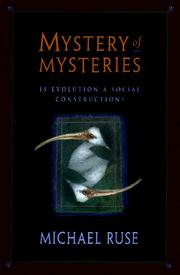
ISBN: 067446706X 0674005430 9780674467064 9780674005433 Year: 1999 Publisher: Cambridge, Mass. London Harvard University Press
Abstract | Keywords | Export | Availability | Bookmark
 Loading...
Loading...Choose an application
- Reference Manager
- EndNote
- RefWorks (Direct export to RefWorks)
Is science objective, a disinterested reflection of reality, as Karl Popper and his followers believed? Or is it subjective, a social construction, as Thomas Kuhn maintained? This text gives an enlightening inquiry into the nature of science, using evolutionary theory as a case study.
Biologen --- Biologistes --- Biologists --- Hommes de science --- Scientifiques --- Scientists --- Wetenschappers --- Evolution (Biology) --- Evolution (Biologie) --- Philosophy --- Historiography --- Attitudes --- Philosophie --- Historiographie --- evolutietheorie (evolutieleer, darwinisme) --- wetenschapsfilosofie --- théorie de l'évolution (darwinisme) --- philosophie des sciences --- Biologists. --- Science --- Scientists. --- Philosophy. --- Attitudes. --- Professional employees --- Normal science --- Philosophy of science --- Life scientists --- Naturalists --- Philosophy of nature --- Evolution (Biology) - Philosophy. --- Science - Philosophy.
Book
ISBN: 2070766810 9782070766819 Year: 2006 Volume: *6 Publisher: Paris: Gallimard,
Abstract | Keywords | Export | Availability | Bookmark
 Loading...
Loading...Choose an application
- Reference Manager
- EndNote
- RefWorks (Direct export to RefWorks)
En 1972, Stephen Jay Gould bouleversa l'orthodoxie darwinienne - autrement appelée la «théorie synthétique de l'évolution». Il formulait la théorie de l'équilibre ponctué: le changement, au cours des temps géologiques, ne s'était pas fait de manière graduelle, comme l'avait soutenu Darwin, mais par des phases de stabilité suivies de phases de changement rapides, permettant l'apparition de nouvelles espèces. Cette thèse, largement confirmée aujourd'hui, a conduit S. J. Gould à réexaminer la théorie darwinienne et à la repenser profondément. L'ouvrage, fruit de ce travail de réflexion et de conceptualisation, est le livre fondateur d'une nouvelle théorie de l'évolution, à partir d'un élargissement du darwinisme.
Evolution (Biology) --- Punctuated equilibrium (Evolution) --- Adaptation (Biology) --- Evolution (Biologie) --- Equilibres ponctués, Théorie des (Evolution) --- Adaptation (Biologie) --- evolutietheorie (darwinisme) --- théorie de l'évolution (darwinisme) --- Equilibres ponctués, Théorie des (Evolution) --- Évolutionnisme. --- Ponctualisme --- Évolution (biologie) --- Darwinisme --- Équilibres ponctués --- Adaptation (biologie) --- Ponctualisme. --- Darwinisme.
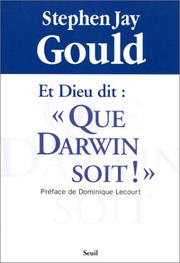
ISBN: 2020381982 9782020381987 Year: 2000 Publisher: Paris Seuil
Abstract | Keywords | Export | Availability | Bookmark
 Loading...
Loading...Choose an application
- Reference Manager
- EndNote
- RefWorks (Direct export to RefWorks)
Depuis la Renaissance, le problème des rapports entre science et religion a marqué la culture occidentale. Déjà aux XVIIIième siècle, Alexander Pope, dans un célèbre épigramme, avait ironiquement commenté la difficulté de réconcilier une vision théologique traditionnelle et les nouvelles découvertes scientifiques: "La Nature et ses lois gisaient cachées dans les ténèbres. Dieu dit: "Que Newton soit", et tout s'illumina." Plus tôt encore, Galilée avait insistée sur la séparation des buts poursuivis par la science et la religion, arguant que, si la première peut nous dire comment est le ciel, seule la seconde peut nous enseigner comment y aller. La paléontoloque Stephen J. Gould, plus que tout autre scientifique de notre époque, a dû affronter ces problèmes. Il reprend l'idée d'une sage distinction entre ces deux grandes institutions de l'esprit humain, et affirme la nécessité d'un principe de "non-empiètement des magistères" (NOMA) entre science et religion. La préface du philosophe Dominique Lecourt apporte un précieux éclairage.
Evolution (Biology) --- Creationism --- Religion and science --- Evolution (Biologie) --- Créationnisme --- Religion et sciences --- Darwinisme --- Creationnisme --- Philosophie de la nature --- Histoire. --- Aspect religieux --- Histoire des doctrines. --- evolutietheorie (darwinisme) --- théorie de l'évolution (darwinisme) --- Créationnisme --- Darwinisme - Histoire. --- Darwinisme - Aspect religieux --- Creationnisme - Histoire des doctrines.
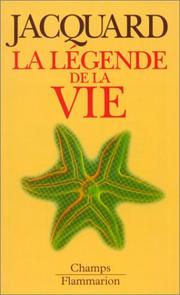
ISBN: 2080814443 9782080814449 Year: 1999 Volume: 444 Publisher: Paris Flammarion
Abstract | Keywords | Export | Availability | Bookmark
 Loading...
Loading...Choose an application
- Reference Manager
- EndNote
- RefWorks (Direct export to RefWorks)
La vie a-elle eu un début? Est-elle même définissable? Son histoire est en fait celle de l'Univers. Pour la raconter , telle qu'elle peut être reconstituée, Albert Jacquard évoque les différentes réponses que sciences, religions, mythes ou arts ont tenté d'apporter à ces interrogations. Conteur, il mêle à l'objectivité du scientifique la profondeur du philosophe.
Life (Biology)
---
Evolution (Biology)
---
Natural history
---
#BIBC:ruil
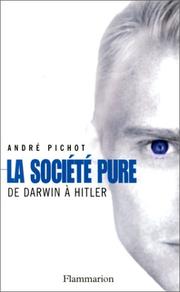
ISBN: 2082127052 9782082127059 Year: 2000 Publisher: Paris : Flammarion,
Abstract | Keywords | Export | Availability | Bookmark
 Loading...
Loading...Choose an application
- Reference Manager
- EndNote
- RefWorks (Direct export to RefWorks)
L'auteur, philosophe spécialisé dans l'histoire des sciences, analyse les multiples liens tissés depuis le XIXe jusqu'à nos jours entre la biologie et les pratiques et discours dans la société. Il montre comment certaines idéologies véhiculées par la biologie nourrissent les idéologies politiques, de l'eugénisme au racisme, en passant par le darwinisme social.
Racism --- Eugenics --- Genetics --- Ideology --- Racisme --- Eugénisme --- Génétique --- Idéologie --- History --- Histoire --- Eugenics. --- Human biology. --- Human genetics. --- evolutietheorie (evolutieleer, darwinisme) --- eugenetica (eugenese, eugenetiek) --- sociologie (sociologische aspecten) --- théorie de l'évolution (darwinisme) --- eugénisme (eugénique) --- sociologie (aspects sociologiques) --- Eugénisme --- Génétique --- Idéologie --- Human biology --- Human genetics --- Bias, Racial --- Race bias --- Race prejudice --- Racial bias --- Homiculture --- Race improvement --- Prejudices --- Anti-racism --- Critical race theory --- Race relations --- Heredity, Human --- Physical anthropology --- Biology --- Euthenics --- Heredity --- Involuntary sterilization
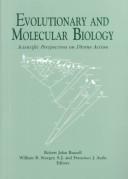
ISBN: 0268027536 9780268027537 Year: 1998 Volume: 3 Publisher: Vatican City Vatican Observatory
Abstract | Keywords | Export | Availability | Bookmark
 Loading...
Loading...Choose an application
- Reference Manager
- EndNote
- RefWorks (Direct export to RefWorks)
This collection of twenty-two research papers explores the creative interaction between evolutionary and molecular biology, philosophy, and theology. It is the result of the third of five international research conferences co-sponsored by the Vatican Observatory, Rome, and the Center for Theology and the Natural Sciences, Berkeley. The overarching goal of these conferences is to support the engagement of constructive theology with the natural sciences and to investigate the philosophical and theological elements in ongoing theoretical research in the natural sciences.
Evolution --- Biology --- Molecular genetics --- Evolutionary genetics --- Religious aspects --- ontwikkelingsbiologie --- moleculaire biologie --- evolutietheorie (evolutieleer, darwinisme) --- theologie (theologische aspecten) --- godsdienst (religie, religieuze aspecten) --- biologie du développement --- biologie moléculaire --- théorie de l'évolution (darwinisme) --- théologie (aspects théologiques) --- religion (aspects religieux) --- Genetic evolution --- Life sciences --- Biomass --- Life (Biology) --- Natural history --- Philosophy --- Creation --- Emergence (Philosophy) --- Teleology --- Evolution (Biology) --- Genetics --- Evolution - Religious aspects - Congresses. --- Biology - Religious aspects - Congresses. --- Molecular genetics - Congresses. --- Evolutionary genetics - Congresses.
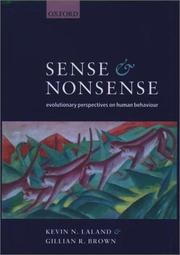
ISBN: 0198508840 Year: 2005 Publisher: Oxford Oxford university press
Abstract | Keywords | Export | Availability | Bookmark
 Loading...
Loading...Choose an application
- Reference Manager
- EndNote
- RefWorks (Direct export to RefWorks)
Can evolutionary theory really help us to understand human behaviour? This is an introduction to the science behind the works of Dawkins, Dennett, Wilson and Pinker. Including profiles of the major protagonists, the book provides a truly balanced account of evolutionary theories of human behaviour, and all their faults. Evolutionary theory is one of the most wide-ranging and inspiring of scientific ideas. It offers a battery of methods that can be used to help us understand human behaviour. Nevertheless, the legitimacy of this exercise is at the centre of a heated controversy that has raged for over a century. Many evolutionary biologists, anthropologists and psychologists have taken these evolutionary principles and tried using them to explain a wide range of human characteristics, such as homicide, religion and sex differences in behaviour. Others, however, are sceptical of these interpretations. Moreover, researchers disagree as to the best ways to use evolution to explore humanity, and a number of schools have emerged. 'Sense and Nonsense' provides an introduction to the ideas, methods, and findings of five such schools, namely, sociobiology, human behavioural ecology, evolutionary psychology, memetics, and gene-culture co-evolution. Carefully guiding the reader through the mire of confusing terminology, claim and counter-claim, and polemical statements, Laland and Brown provide a balanced, rigorous analysis that scrutinizes both the evolutionary arguments and the allegations of the critics. This is a book that will make fascinating reading for popular science readers, undergraduate and postgraduate students (for example, in psychology, anthropology and zoology), and for experts in one approach who would like to know more about the other perspectives. Having completed this book the reader will feel better placed to assess the legitimacy of claims made about human behaviour under the name of evolution, and to make judgements as to what is sense and what is nonsense.
159.9 --- 130.123.42 --- 130.123.42 Evolutie in de menselijke cultuur. Ontwikkelingsstadia van de mensheid --- 130.123.42 Metabletica. Leer der veranderingen --- Evolutie in de menselijke cultuur. Ontwikkelingsstadia van de mensheid --- Metabletica. Leer der veranderingen --- Psychologie --- menselijk gedrag --- comportement humain --- Evolutionary psychology --- Psychology --- Human evolution --- Evolution. Phylogeny --- Human ecology. Social biology --- Evolutionary psychology. --- Psychologie évolutionniste. --- evolutietheorie (darwinisme) --- théorie de l'évolution (darwinisme)

ISBN: 2020344017 9782020344012 Year: 2000 Volume: S153 Publisher: Paris Seuil
Abstract | Keywords | Export | Availability | Bookmark
 Loading...
Loading...Choose an application
- Reference Manager
- EndNote
- RefWorks (Direct export to RefWorks)
Le présent ouvrage porte sur la nature du darwinisme, de la génétique, la différence entre les modèles instructifs et sélectifs, et l’application de ces modèles de hasard-sélection à toute la biologie. Il entend décrire ainsi une autre théorie, qui déplace l’explication du niveau des gènes vers les êtres vivants eux-mêmes, et dans laquelle la liberté remplace le déterminisme. Les auteurs montrent, de la molécule à l'homme, en passant par les cellules et les virus, que règne moins la dictature d'un dieu-programme présent au cœur de l'ADN qu'un hasard permanent, guidé par la sélection naturelle. La question importante est posée : l’application de modèles de hasard-sélection à des phénomènes aussi variés que l’évolution, l’embryogenèse, l’immunologie, le système nerveux, est-elle le fruit d’un placage artificiel d’un modèle sur tous les objets possibles, une simple coïncidence, une mode, une erreur de logique ? Sinon, le darwinisme possède-t-il une valeur intrinsèque qui fonde sa pertinence et lui donne un potentiel d’explication s’étendant à toute la biologie ? S’il s’avère que le modèle de hasard-sélection est réellement capable d’expliquer tous ces phénomènes, cela signifierait que Darwin n’a pas seulement énoncé la loi de l’évolution, mais découvert le fondement d’une théorie générale capable d’expliquer toute émergence et diversification d’une structure biologique. Pour tenter de répondre à cette question, il s’agira d’abord pour les auteurs de retrouver les sources historiques et philosophiques du darwinisme. Cette analyse va révéler une contradiction profonde entre le darwinisme et la génétique, contradiction qui mine la capacité explicative de la biologie contemporaine.
Biology --- Molecular genetics. --- Heredity. --- Biologie --- Génétique moléculaire --- Hérédité --- Philosophy. --- Philosophie --- hérédité --- Evolutionisme --- Heredity --- Molecular genetics --- biologie(biologische aspecten) --- erfelijkheid (erfelijke aanleg) --- evolutietheorie (darwinisme) --- genetica (genen) --- erfelijkheid --- Evolutieleer --- Genetica --- Immunologie --- Microbiologie --- Ancestry --- Descent --- Inheritance (Biology) --- Pangenesis --- Philosophy --- biologie(aspects biologiques) --- hérédité (disposition héréditaire, prédisposition héréditaire) --- théorie de l'évolution (darwinisme) --- génétique (gènes) --- Génétique --- Genetics --- Molecular biology --- Breeding --- Atavism --- Eugenics --- Mendel's law --- Natural selection --- Vitalism --- Biology - Philosophy.
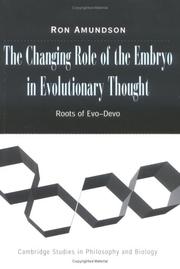
ISBN: 0521806992 9780521806992 9781139164856 9780521703970 0511113269 9780511113260 1139164856 9780511198236 051119823X 1107131391 9781107131392 1280415169 9781280415166 9786610415168 6610415161 0511181485 9780511181481 0511112750 9780511112751 0521703972 051130885X Year: 2005 Publisher: Cambridge New York Cambridge University Press
Abstract | Keywords | Export | Availability | Bookmark
 Loading...
Loading...Choose an application
- Reference Manager
- EndNote
- RefWorks (Direct export to RefWorks)
In this book Ron Amundson examines two hundred years of scientific views on the evolution-development relationship from the perspective of evolutionary developmental biology (evo-devo). This perspective challenges several popular views about the history of evolutionary thought by claiming that many earlier authors had made history come out right for the Evolutionary Synthesis. The book starts with a revised history of nineteenth-century evolutionary thought. It then investigates how development became irrelevant with the Evolutionary Synthesis. It concludes with an examination of the contrasts that persist between mainstream evolutionary theory and evo-devo. This book will appeal to students and professionals in the philosophy of science, and the philosophy and history of biology.
Developmental biology --- Embryology --- Evolution (Biology) --- evolutietheorie (darwinisme) --- Animal embryology --- Animals --- Development, Embryological --- Development, Embryonic --- Development, Zygotic --- Embryogenesis --- Embryogeny --- Embryological development --- Embryonic development --- Zoology --- Zygote development --- Zygotes --- Zygotic development --- Zygotic embryogenesis --- Morphology (Animals) --- Embryos --- Reproduction --- Development (Biology) --- Biology --- Growth --- Ontogeny --- Philosophy --- théorie de l'évolution (darwinisme) --- Development --- Philosophy. --- Evolutionary developmental biology --- Developmental evolution (Biology) --- Evo-devo (Evolutionary developmental biology) --- Evolution of development (Biology) --- Evolutionary biology of development --- Arts and Humanities

 Search
Search Feedback
Feedback About
About Help
Help News
News